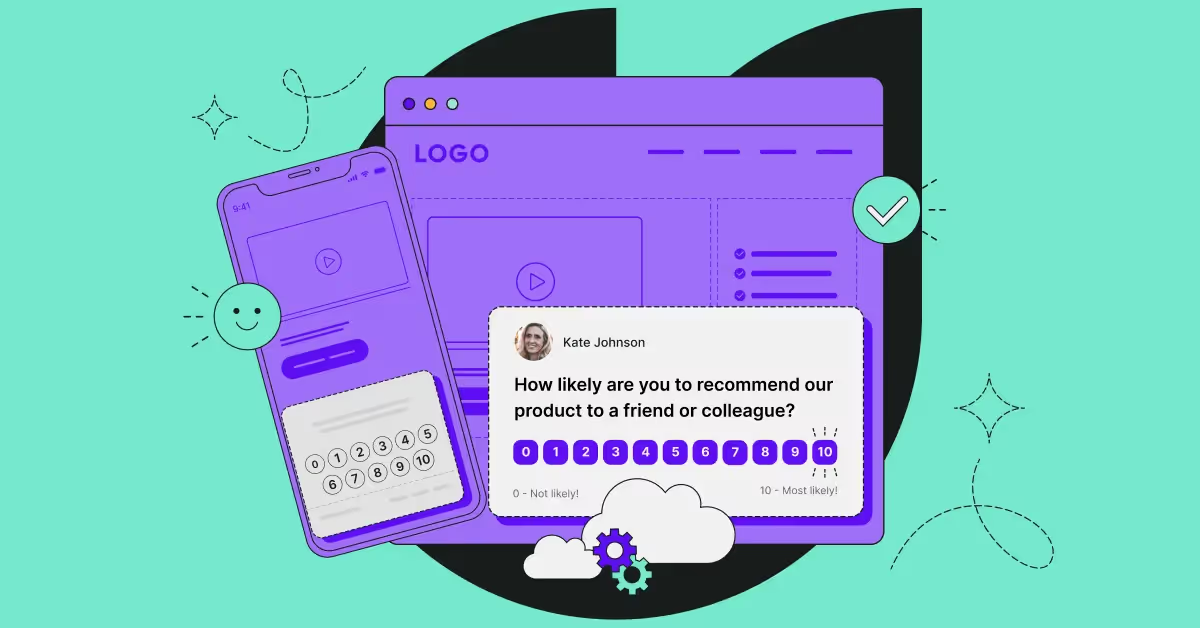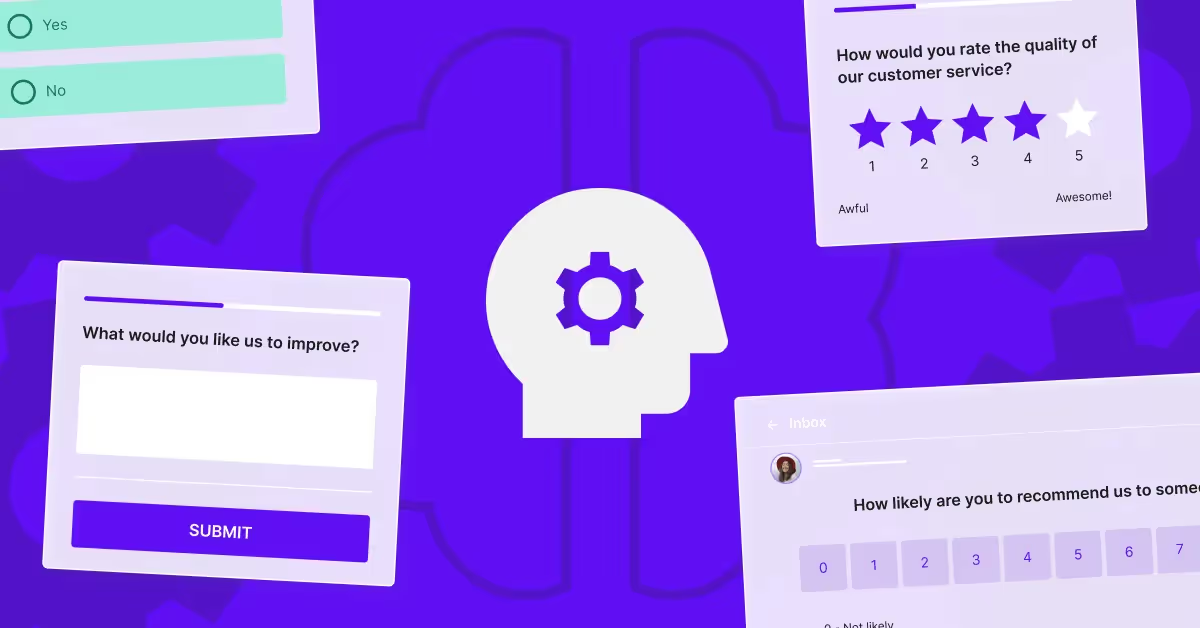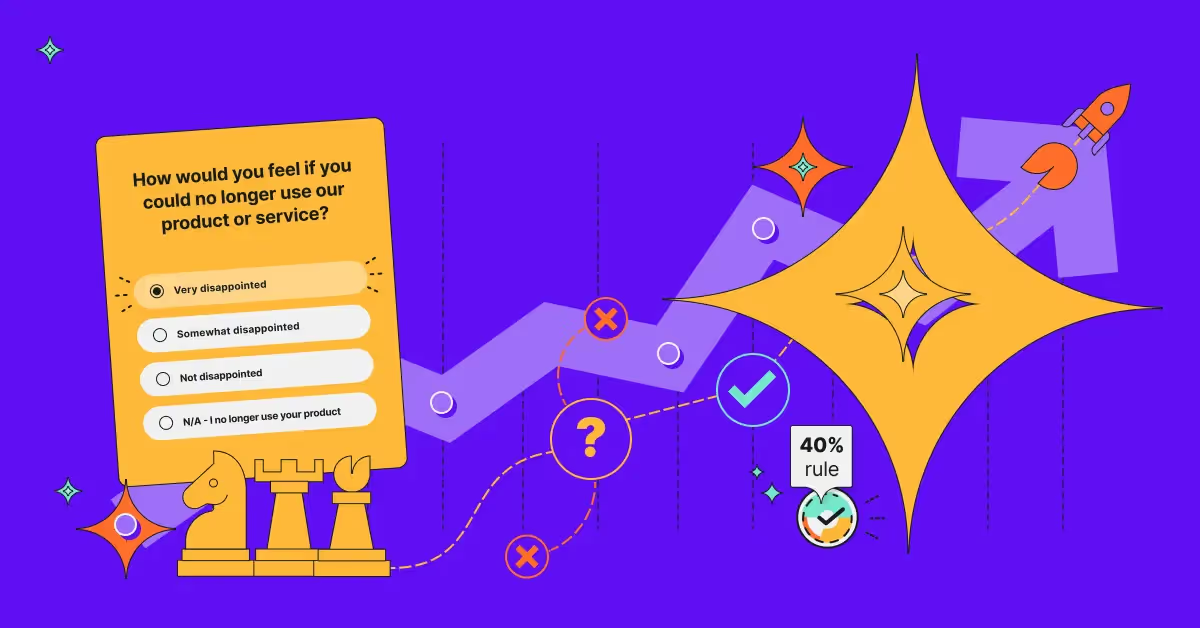As a marketer, you need to understand how customers see your brand and what improvements to make before it's too late. You also need to keep an eye on how your competitors are doing and how much you know about your target market.
One way to answer these questions is by collecting feedback from your customers. It will allow you to make smarter marketing decisions about your pricing, messaging, and any other marketing strategies.
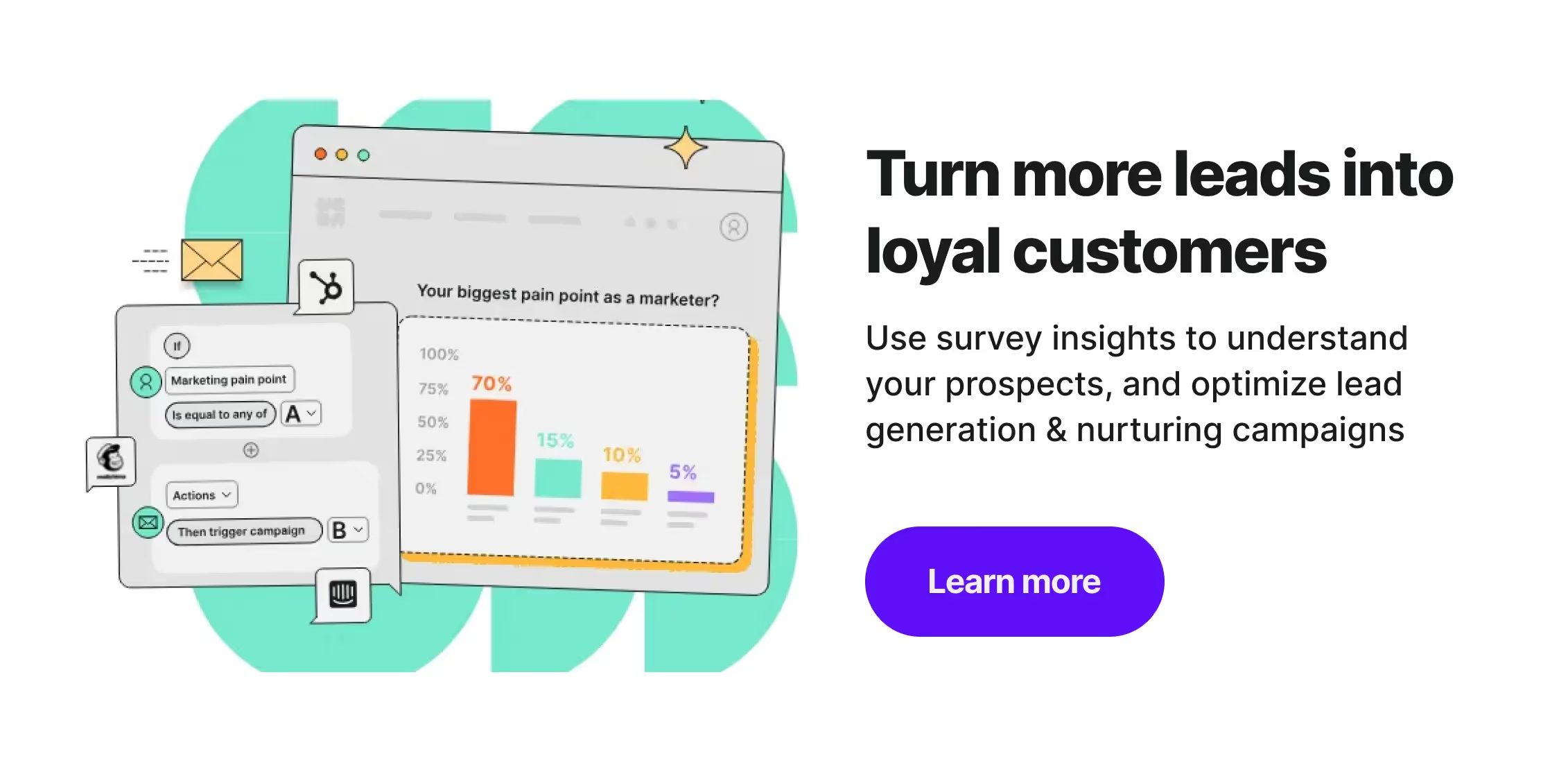
Top 10 online marketing surveys
- Customer Research
- NPS (Net Promoter Score) Surveys
- Product Research Surveys
- CSAT (Customer Satisfaction) Surveys
- Content Evaluation Surveys
- Market Research Surveys
- Website Feedback Surveys
- Contact Form Surveys
- Brand Awareness Surveys
- Customer Churn Reasons Surveys
Now, you might be wondering how to use these marketing surveys to understand customer experience and stay competitive. Below, we provide a detailed breakdown of each survey to help you create better marketing strategies.
Also, you’ll get to see what are the most popular distribution channels and integrations of marketing surveys. This lets you in on how other marketers go about surveying their audience!
Ready to jump right into running surveys? Create your free Survicate account now.

Customer Research Surveys
The first on our list is the customer research survey, which represents 28% of all the surveys sent to customers. No surprise, as marketers need to know who their target customers are in order to drive growth.
Examples of marketing survey questions for a customer research survey
- Which of the following best describes your role in the purchase process?
- What is the main reason you chose X?
- How are you primarily using X?
- What type of business do you represent? What is your role?
- What are the main problems you want to solve with X?
- What is the biggest everyday annoyance when communicating with leads?
Why it's useful: Sending customer research surveys to existing customers will help you find actionable insights, including their job titles, pain points, and interests. This will let you target and personalize your marketing efforts toward consumer preferences.
NPS (Net Promoter Score) Surveys
NPS surveys, which have become an industry standard, make up 20% of all surveys sent via Survicate. They consist of a question on how likely your customers are to recommend your company to others. Thanks to the responses, you will be able to predict repurchases and referrals.
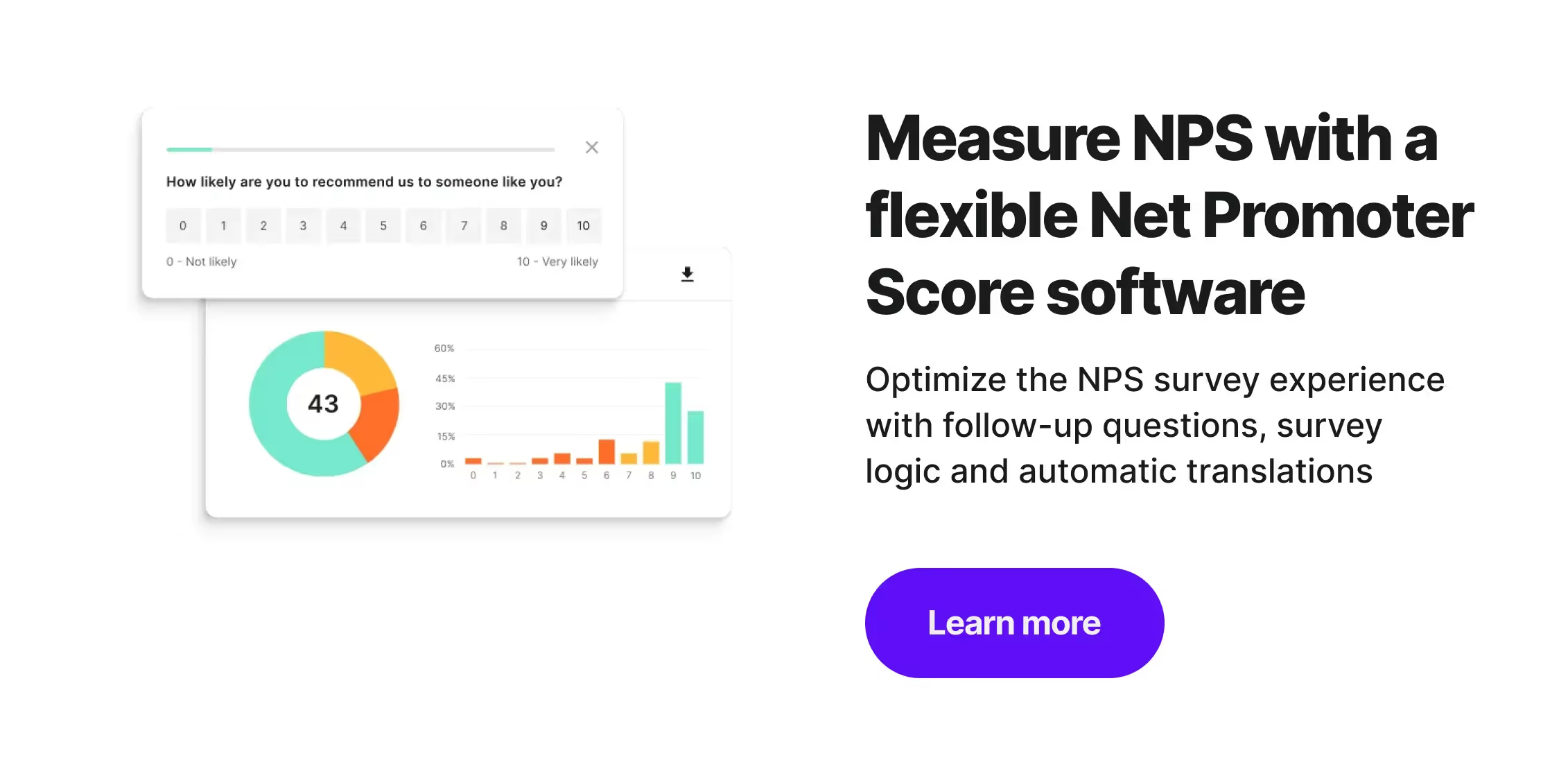
Examples of NPS survey questions
- On a scale of 0-10, how likely are you to recommend our services to the people like you?
- Based on your recent purchase, how likely are you to recommend us to people like you?
- Based on your experience so far, how likely are you to recommend our product as a self-study app?
💡 Tip: To learn more about NPS survey questions, check out our blog post on the topic: 13+ NPS Questions for Best Results
Why it's useful: NPS lets you identify the most loyal customers. You can then ask them for case studies, testimonials, quotes, and reviews for marketing collateral.
Use our free NPS survey template:
Product Research Surveys
Product research surveys account for 14% of the most popular marketing surveys. If you want to effectively market new features of your product, you need to understand how different customer segments use them. And to do that, you need to ask effective product survey questions.
Examples of marketing survey questions for a product testing survey
- How important is feature X to you?
- Do you find the new feature easy?
- What new features would you like to see from us?
- How was your experience with the following aspects of the product?
- Why do you rarely use X?
- How would you rate the X mobile app?
Why it's useful: Send product research surveys to better understand user needs. As a result, you will drive better product adoption and market features more effectively.
Use our free product research survey templates:
CSAT (Customer Satisfaction) Surveys
CSAT surveys rank 4th (14% of all surveys), which comes as a surprise. After all, the Customer Satisfaction Score is mostly a customer-support metric, not a marketing one. With that being said, marketers need to keep an eye on the big picture of the customer experience, and measuring customer satisfaction is part of it.
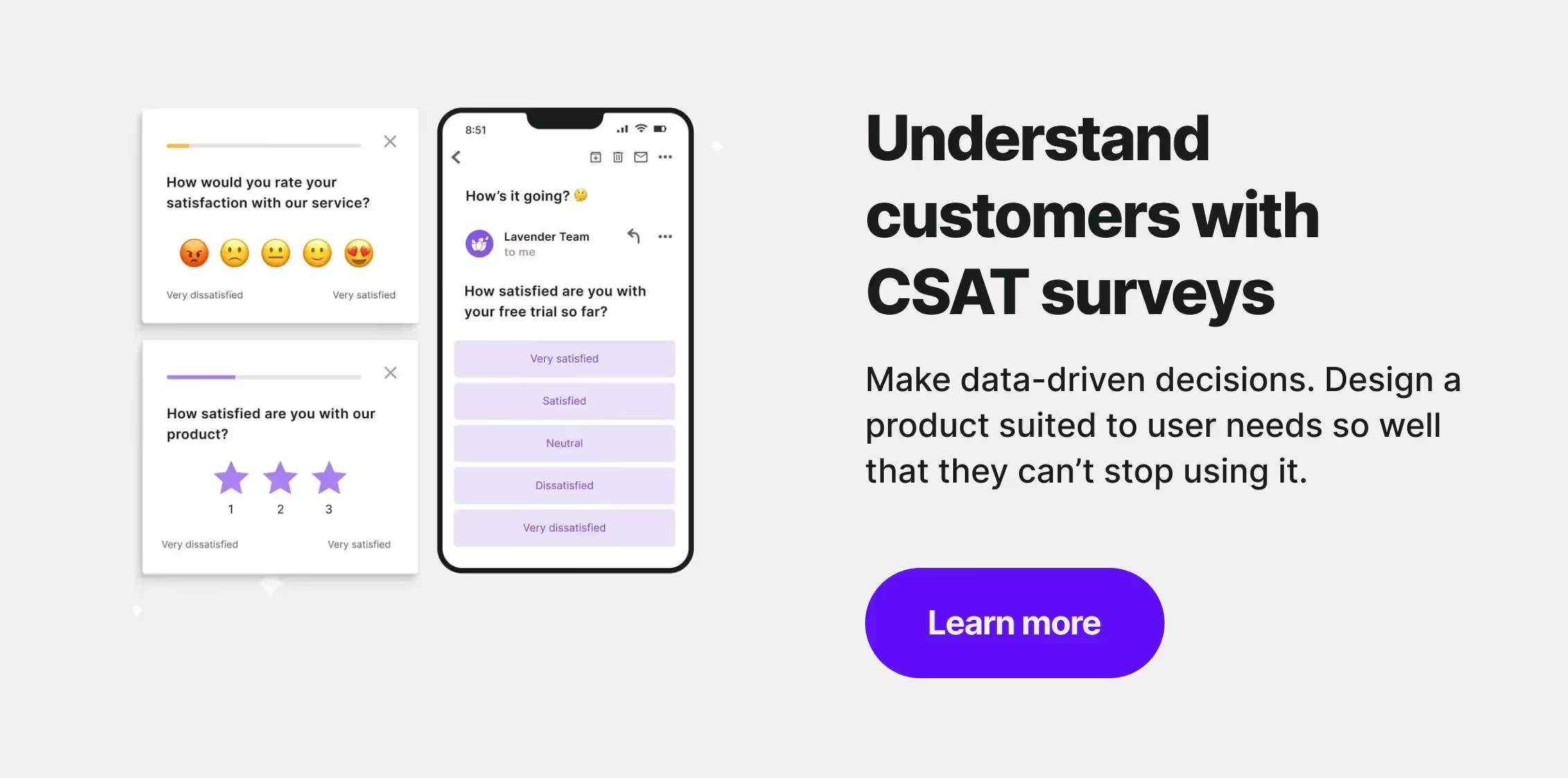
Examples of customer satisfaction survey questions
- How satisfied are you with X services? Did we meet your expectations?
- How would you measure your satisfaction with our platform in general?
- How would you rate your most recent interaction with our support?
Why it's useful: CSAT is interaction-based, meaning you measure customer satisfaction at a specific touchpoint, such as closing a support ticket. You can also enhance customer experience based on CSAT scores by finding out what your customers are struggling with.
Use our free CSAT survey templates:
Content Evaluation Surveys
Content evaluation surveys are a great way to accelerate and improve content creation. Yet, they constitute only 6% of all marketing surveys. If you're a marketer, don't hesitate to use content evaluation surveys to enhance your content marketing efforts.
Examples of marketing survey questions for a content evaluation survey
- What is your overall opinion of our webinar?
- What topics would you like to read about next?
- Do you find the newsletter informative?
- How would you rate the blog article you're reading?
- Is there anything we can do to improve our online events?
Why it's useful: Evaluate the performance of your content and get ideas of what content to produce next. Google Analytics tells you only one side of the story. For example, it can show you that your page has a high bounce rate, but you might not understand why. That's why surveys provide the missing piece to unlock deeper insights and improve your content marketing efforts.
💡 YOU MIGHT ALSO BE INTERESTED IN: Search results accuracy survey template
Market Research Surveys
Ranking 6th on our list, market research surveys account for 6% of all marketing surveys mentioned in this research. If you want to carry out DYI market research, surveys will help you to learn a great deal about customers in your target market.
Examples of marketing survey questions for a market research survey
Why it's useful: With demographic and target market analysis surveys, you can make more informed decisions about messaging, campaigns, pricing, and more. You can also use a competitor research survey to get information about other companies operating in your industry. It might help you bring out your competitive advantage.
Use our free market research survey template
Website Feedback Surveys
Website surveys are invaluable sources of customer feedback for marketers. With a small, unintrusive pop-up survey, you can ask about the clarity of your message, content quality, or pricing. This kind of market research survey contributes to showing an even fuller picture of the overall customer experience.
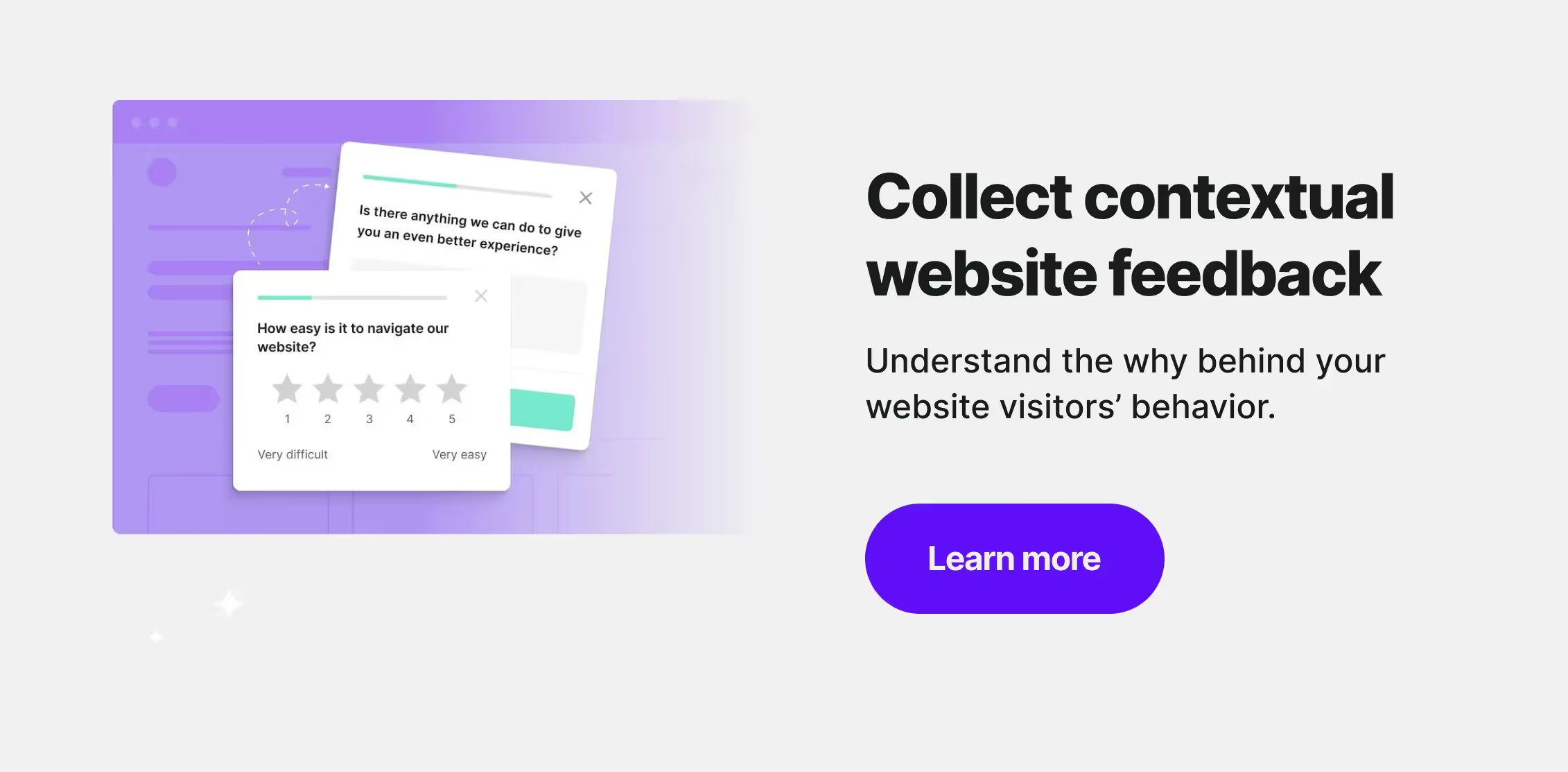
💡Tip: You can also opt for another form of feedback collection—a feedback button widget that, once set up, continuously gathers spontaneous opinions.
Examples of marketing survey questions for a website feedback survey
- Is our website easy to navigate around?
- Did you find what you were looking for?
- Before you go, can you tell us what stopped you from starting a free trial?
- What information is missing from your website?
- In general, how satisfied are you with the website experience?
- What are the most common reasons for you to visit our application?
Why it's useful: With website feedback surveys, you can see if first-time visitors have trouble navigating your site. To do that, set surveys to appear while a user is browsing your website. That way, you get in-context, real-time insights to help your design and content.
Use our free website survey templates:
Brand Awareness Surveys
Brand awareness surveys are surprisingly far down the list, ranking 8th and totaling 3% of all surveys. One of the reasons could be that even though marketers realize it's important to measure brand awareness, few of them know how to do it.
Examples of marketing survey questions for a brand awareness survey
- Please describe our product/service in one sentence.
- When was the last time you used this product category?
- When you think of this product type, what brands come to your mind?
- Which value proposition statement resonates with you the most?
- What adjectives would you use to describe X if it had a personality?
- How did you find us?
Why it's useful: Find out if it's your brand or your competitor that comes of your customers' mind when they want to purchase a product in your category.
Contact Forms
Contact forms are 9th on the list, equaling 2% of all the marketing surveys. You can use contact forms on your website or send them by email. Contact forms are great for getting people to sign up for your newsletter, events, or gated content.
Examples of marketing survey questions for a contact form survey
- What's your current job role?
- Would you rather talk to a person? Leave your contact details below!
- Would you like to get updates about the new online marketing resources we produce? Sign up for our newsletter to get exclusive content for free!
- What's your biggest challenge in X?
- What are your preferences when it comes to Y?
- What's your website?
- How many employees are there in your organization?
Why it's useful: Use a contact form question in your survey so you can collect new leads, update contact information, and create buyer personas. You can also send the collected information to your CRM or marketing automation tool.
Churn Reasons Surveys
Last on our list are churn reasons surveys. As one of the biggest obstacles faced by digital businesses, customer churn can be avoided or at least reduced with carefully drafted surveys that get to the bottom of the problem.
Examples of marketing survey questions for a churn reasons survey
- What is the primary reason for canceling your subscription?
- What were your expectations that we couldn't meet?
- What was your main motivation to register with X?
- What alternative did you find?
Why it's useful: There are plenty of ways to predict churn before it starts affecting your business.
Use our free churn survey template:
8 Steps to conduct market research with surveys
1. Define your survey goals
Before starting, decide what you want to achieve with your survey. Is it to understand customer satisfaction, product feedback, or brand awareness? Clear goals will help you ask the right questions and analyze the results properly.
2. Identify your target audience
Think about who should answer your survey. Is it existing customers, potential leads, or specific segments based on location or demographics? Knowing your audience helps you frame relevant questions.
3. Choose the right survey type
Pick the best survey type based on your goals. Popular types include customer research surveys, NPS (Net Promoter Score), and product feedback surveys. Each type serves a different purpose, so choose the one that aligns with your objectives.
4. Craft your questions
Write clear, simple, and unbiased questions. Mix question types, such as multiple-choice, open-ended, and Likert scale questions, to gather both quantitative and qualitative data. Avoid leading or complex questions that confuse respondents.
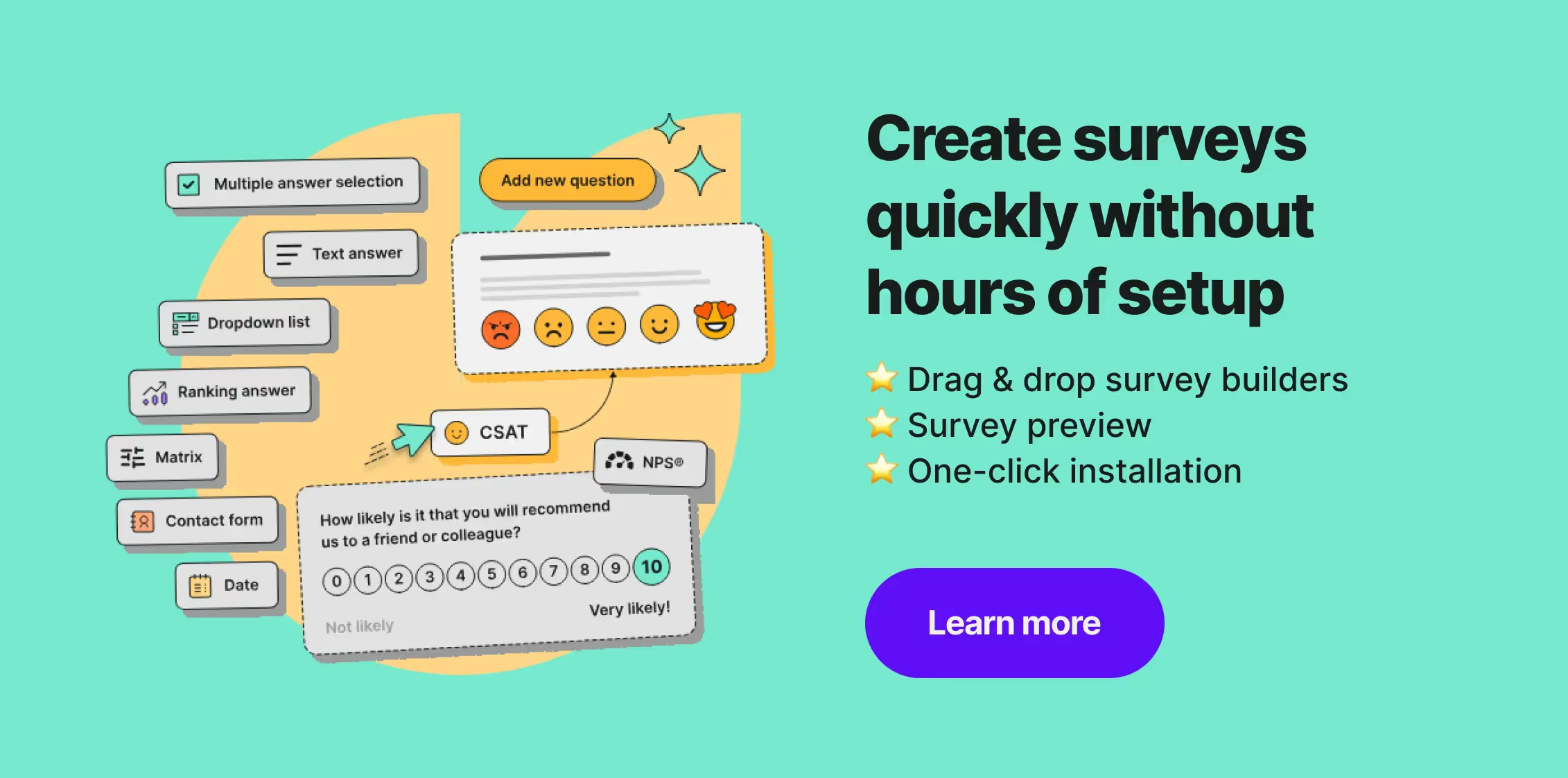
💡 Tip: You can create your survey from scratch, but if you don't have experience in the field, we recommend using a ready-to-go survey template (Survicate offers a whole AI-powered library). Apart from these options, you can also create a survey using AI with Survicate. All it takes is you to describe your needs, and it takes about 25 seconds to generate the survey.
5. Test your survey
Always run a test with a small group before the full launch. It saves you a lot of stress and helps spot errors, confusing questions, or technical issues. Use the feedback to refine your survey for better responses.
6. Distribute the survey
Decide how to send the survey to your audience. Email, sharing a link on social media platforms, or using a pop-up on your website are all good channels. Make sure to keep your target customers in mind when choosing a distribution method.
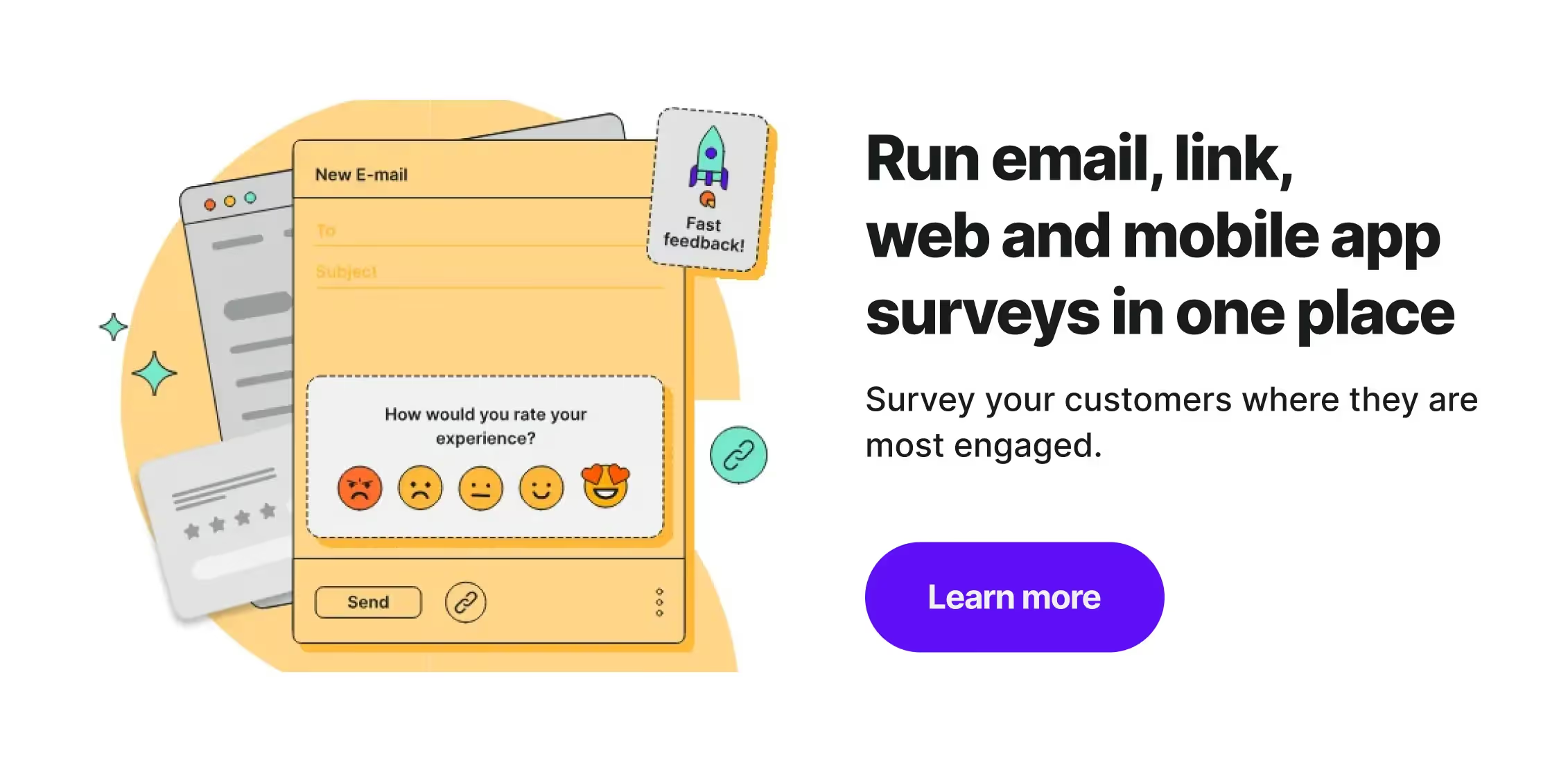
7. Analyze results
Once responses come in, review the data carefully. While analyzing customer feedback, look for trends, patterns, and key insights. Charts and graphs will help you to visualize the data.
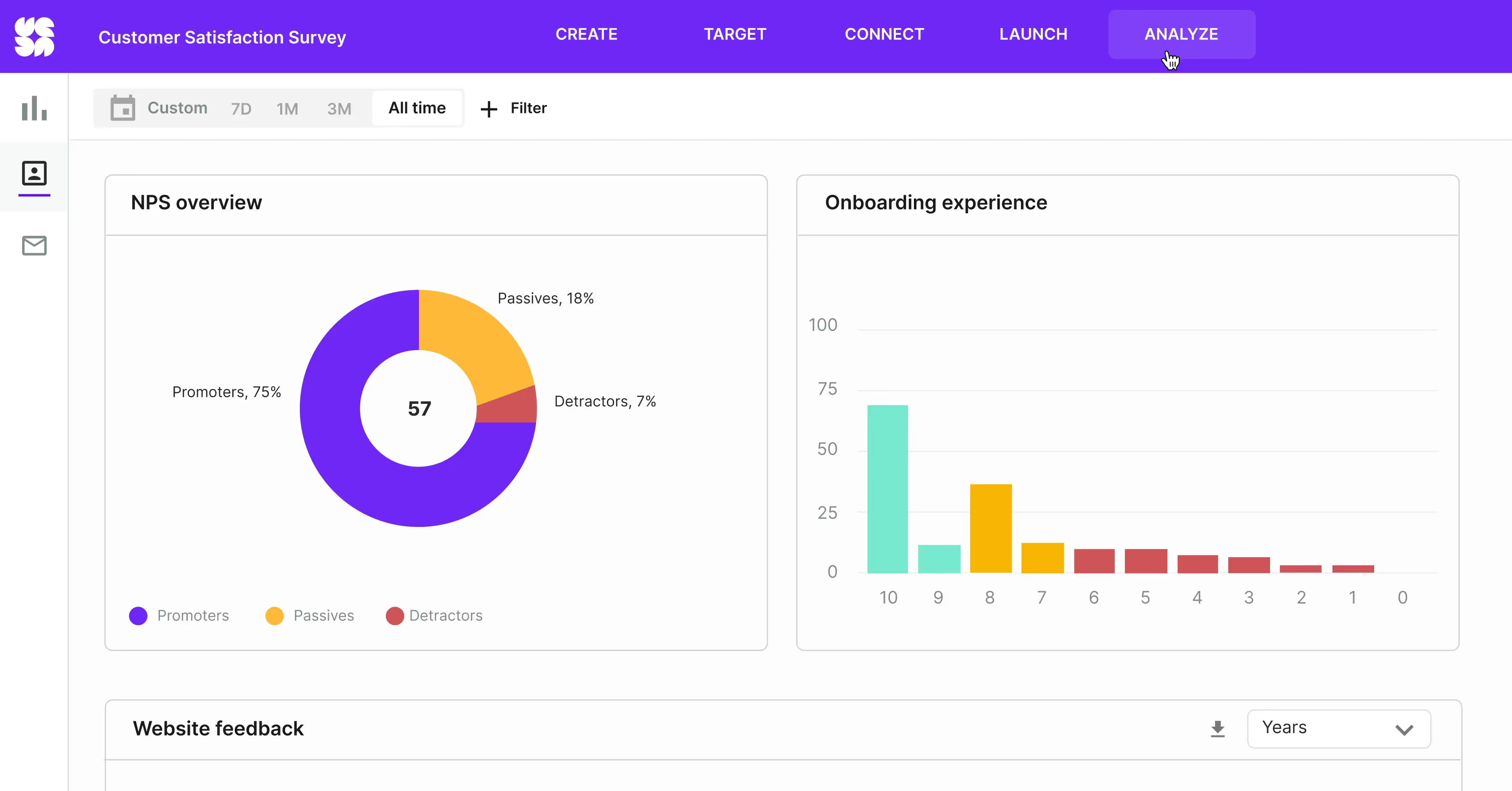
8. Take action based on insights
The final step is to act on your market research or, in other words, close the feedback loop.
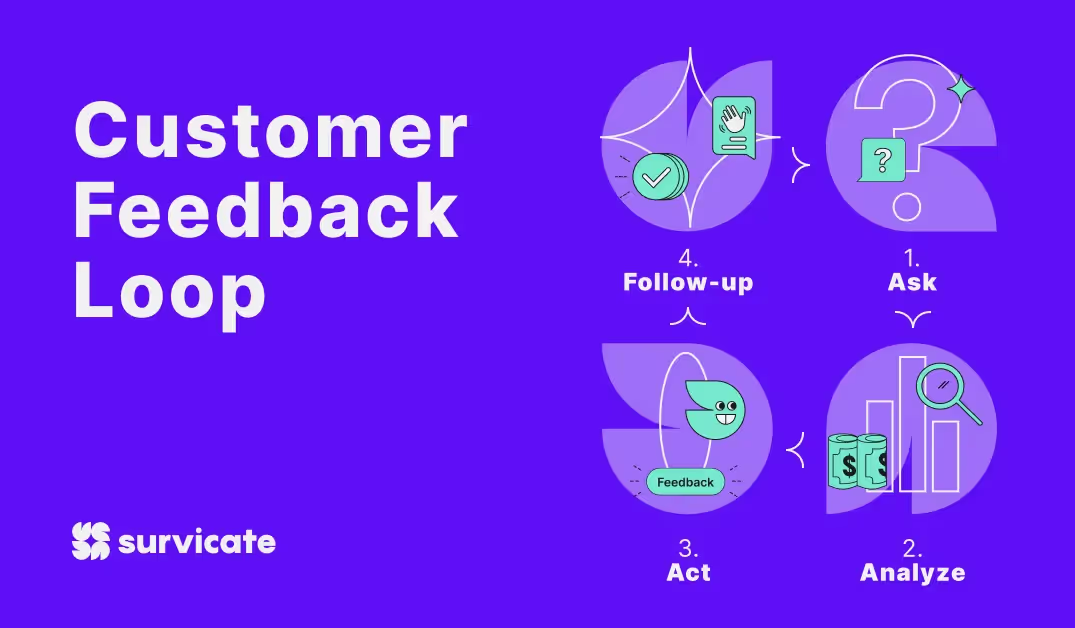
Whether improving your marketing strategy, building targeted marketing campaigns, or conducting competitive analysis, make sure to use the insights to drive real business improvements.
How marketers send marketing surveys
Would you like to discover the most popular distribution channels, email marketing tools, and integrations used to send these top 10 marketing surveys? Here's how other marketers go about sending the surveys listed in this blog post.
The most popular survey distribution tools (for email and link surveys):
- Shareable link (49%)
- HubSpot (20%)
- Klaviyo (11%)
- ActiveCampaign (8%)
- Intercom (7.4%)
- Mailchimp (7%)
- Marketo (5.5%)
- Salesforce (3.4%)
- Braze (3.3%)
- Customer.io, Sendgrid, GetResponse (2%)
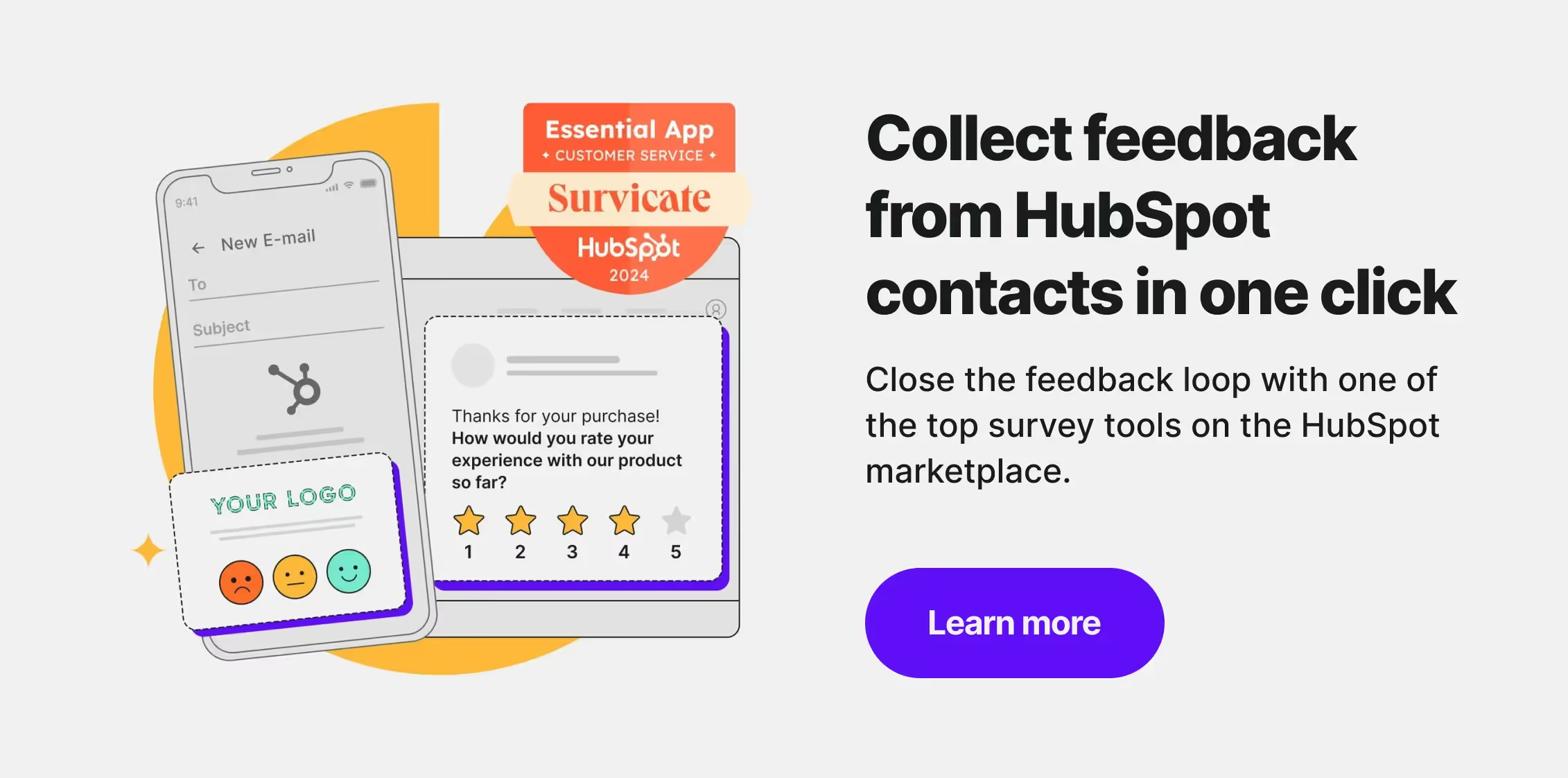
The most popular integrations with a survey tool:
- Google Sheets (21.7%)
- HubSpot (18.3%)
- Slack (9.2%)
- Klaviyo (7.9%)
- Intercom (7.7%)
- ActiveCampaign (4.6%)
How to start sending marketing surveys
Now that you've learned what the most popular marketing surveys are, it's time to put that knowledge into practice. Survicate offers multichannel surveys with advanced skip logic and targeting, but that's not all.
With Feedback Hub you can combine feedback from different sources and have it categorized automatically into topics. You can also use the AI Research Assistant to gain valuable insights by asking questions about your customer feedback.
Join Survicate for free and gain access to all Growth plan features during our 10-day trial. Get valuable customer feedback insights and take a look at our pricing to find the right plan for your business.
You might also be interested in:
- Best Product Marketing Software to Try in 2024
- Top 10 Hubspot Integrations for Marketers
- The Ultimate Guide to Crafting a Winning Product Marketing Strategy








